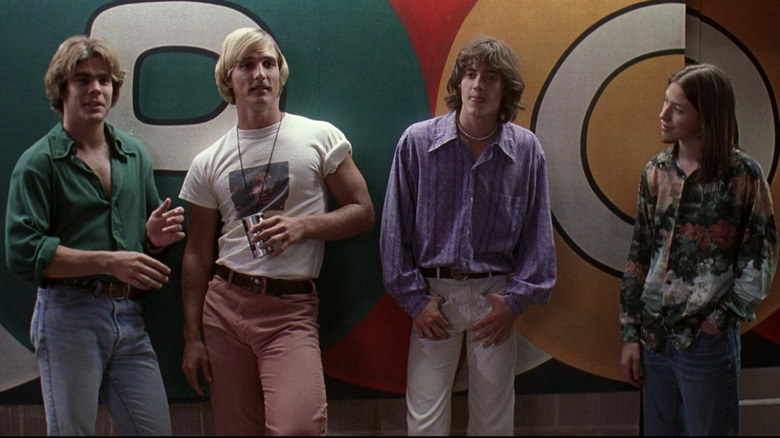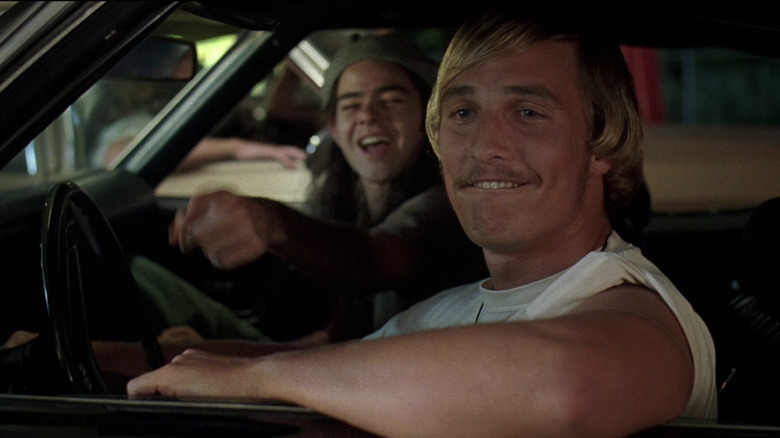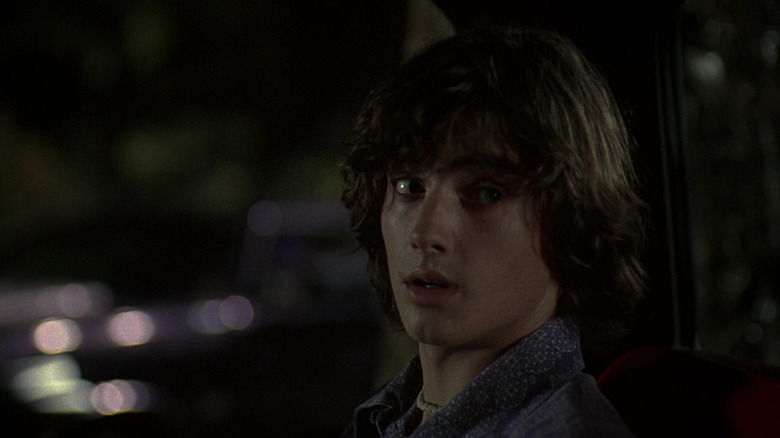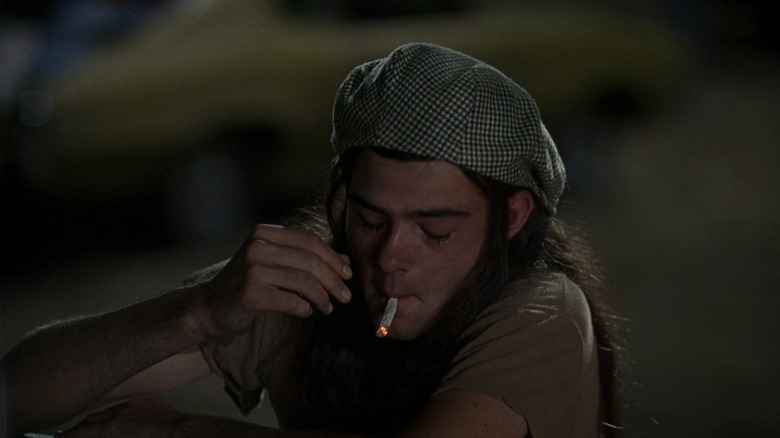Using His Own Life For Dazed And Confused Landed Richard Linklater In Legal Hot Water
Anyone who has ever taken a single fiction writing class knows that successful stories typically include a person or people with a problem and a bumpy ride through that problem that hints at a universal truth or life lesson. It sounds a bit stale and cliche on paper, but it's a winning formula that was coined "The Hero's Journey" by Joseph Campbell back in 1949. The method can be traced back to ancient times and continues to pop up in literature and film. As an audience, we love to watch protagonists struggle, even suffer, as long as it leads to an interesting journey and a positive change. We give the film bonus points if you find a way to make the character and their journey relatable.
It's fun to watch larger-than-life characters like Tony Stark begin as a cocky arms dealer and evolve into a world savior, but a protagonist's journey is most effective when the character is so recognizable that they feel like an old friend, a family member, or a guy you knew in high school. Richard Linklater's films often feature such characters. In his most popular films, the director focuses on the trials and tribulations of average people who live normal lives. In "Slacker," the camera wanders around the streets of Austin, Texas, and provides a snapshot of a moment in random strangers' days. In "The Before Trilogy," the audience experiences the highs and lows of a relationship, from first meeting to marriage and parenthood. Linklater's talent as a filmmaker lies in his ability to tap into universal experiences and characters without creating cliches or preaching to his audience.
But according to Today, "Dazed and Confused" hits a little too close to high school for three Texans. Back in 2004, Bobby Wooderson, Andy Slater, and Richard "Pink" Floyd sued their former classmate, Linklater, for using their names and likeness without permission. The trio claims that their association with the "Dazed and Confused" characters has really gotten in the way of their livin', man.
Defamed by Dazed
"Dazed and Confused" focuses on a group of teenagers through their last day of school and final high school party. All the classic archetypes are present and accounted for. There's the stoner, Slater (Rory Cochrane), the quarterback with an attitude, Pink (Jason London), and the 20-year-old who still hangs out with high schoolers, Wooderson (Matthew McConaughey). Chances are, at least one of these character descriptions fits someone you knew as a teenager. Hell, maybe you even identify with one of them. After all, they became cliches for a reason. However, three men from Texas see too much of themselves in the characters.
Wooderson, Slater, and Floyd claim that former classmate, Linklater, used their names and likeness in his film without asking and that the connection has caused damage to their reputations and personal relationships. Slater claims he's often accused of drug use because of his connection to the stoner character in Linklater's film. "I don't sit around the house making bongs — dammit," he told The Washington Post in 2004. Wooderson also resents his connection to the creepy 20-year-old hanger-on character who preys on young girls. He remembers feeling like someone had "kicked [him] in the stomach" when he watched the movie. Floyd recalls his wife watching the film and saying, "'Oh, my God! What are we gonna tell people?'"
The guys claim that they didn't sue back in '93 because they never expected the film to become popular. "It was a low-budget, low-rent movie, and we figured it would just go away," Wooderson told The Washington Post.
A goofy lawsuit
Of course, "Dazed and Confused" didn't fade away into obscurity, it became a cult hit that offered audiences a glimpse of McConaughey, Milla Jovovich, and Ben Affleck before they became huge Hollywood stars. The men claim that the film's long-standing popularity has had a huge impact on their lives. They told The Washington Post that everyone from their mothers to their children's friends have seen the movie and they're embarrassed by it.
In 2004, the three men filed a lawsuit against Linklater and Universal Studios. According to The Washington Post, they claim that the film caused them "severe emotional distress" and "mental anguish." Understandably, Linklater and Universal didn't comment on the case at the time, but the director finally opened up about the litigation in a 2018 interview with Texas Monthly. At first, Linklater had a good laugh about the ridiculousness of the claims. "When those things get filed, it makes headlines, because that's a funny story," he explained, "And then you actually have to go through a legal thing."
Even though the allegations lead to an official court appearance, Linklater explained that nothing else came of it:
"I did have to show up on a Saturday and give a deposition. And then the judge looked at it on Monday and threw it out of court, said it was baseless. It was one of those frivolous goofball lawsuits that you know someone's doing on a percentage, or they're just hoping to get a quick payout. They think you're so rich, or the company is, that they're going to say, 'Here's $100,000, just shut up.' Then the lawyer will take their cut. I think they were kinda hoping for that. I mean, the guys who sued me were so strange, because I barely knew those guys."
Legacy
Only Linklater knows if he actually based his "Dazed and Confused" characters on his former classmates and only the real Slater, Wooderson, and Floyd know if the film has actually negatively impacted their lives. All we know for certain is that none of that was proven in court. Ultimately, the only thing the lawsuit did was further connect the men to the characters they claim to despise.
The allegations and lawsuit made headlines in popular newspapers, and the guys seemed more than eager to provide statements to the outlets. They discussed the various ways they believe they are connected to the film's characters, which they explained to The Washington Post is found in their shared names, Slater's liberal feelings on marijuana laws, and Floyd's second-string position on his high school football team. Giving such an in-depth interview about all the ways they see themselves in the various characters is a very odd tactic for three people who claim they're desperate to disconnect themselves from those personalities.
Linklater feels the lawsuit was a failed attempt at a cash grab from a famous Hollywood director and a successful studio, but there is another possibility. In an interview with The National Endowment for the Arts, Linklater admitted that he wants the audience to experience a deep connection with his films. "[Realism] is my default position," he explained. "I want it to feel like [the film is] really close to you, like 'Oh, this is what life really might feel like if I was in this situation.'"
Perhaps Linklater is so good at telling universal stories and creating realistic characters that the men actually believed the movie was about them. Or maybe they just wanted a bit of attention and some fast cash.
Please let me know if you are aware of any films that feature or even merely allude to a writer by the name of Christian. For research purposes only, of course.



